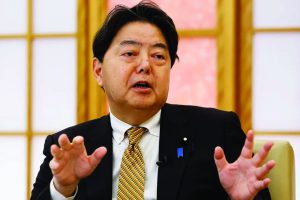BLOOMBERG
Japan and China finished setting up a military hotline aimed at reducing tensions between the two largest economies in Asia, just ahead of a rare meeting of their foreign ministers in Beijing.
The installation of equipment and lines has been completed, Japan’s Ministry of Defense said on Friday in a statement, calling it a “linking mechanism†that will build trust between the militaries and avoid unforeseen situations.
China’s Ministry of National Defense simultaneously issued a statement, saying the hotline would strengthen the ability of both countries to control maritime and air crises and help further maintain regional peace and stability.
Japanese Foreign Minister Yoshimasa Hayashi is set to meet his Chinese counterpart, Qin Gang during a two-day visit in the first such trip by the top diplomatic envoy from Tokyo to the neighbour in about three years.
Tensions between the two countries were raised by Japan announcing it would expand restrictions on exports of 23 types of leading-edge chipmaking technologies, as the US ratchets up efforts to limit China’s access to key semiconductor knowhow.
Tokyo’s move follows months of lobbying by the US to get Japan to join it in tightening shipments of semiconductor tools to China. Japan and the Netherlands had agreed in principle to be part of the US effort, but have sought to chart a middle road between the two superpowers.
Plans for the hotline have been in the work for some time. Chinese President Xi Jinping and Japanese Prime Minister Fumio Kishida agreed at their meeting in Bangkok in November to accelerate talks on the mechanism.
Ties between the neighbours have been frayed by a dispute over East China Sea islands known as Senkaku in Japan and Diaoyu in China. Government vessels from the two countries chase one another on almost a daily basis in the area.
Japan’s Ministry of Defense issues bulletins about incursions by Chinese military vessels into its territorial waters.
Japan Tightens Chip Gear Exports
Japan said it will expand restrictions on exports of 23 types of leading-edge chipmaking technology, as the US ratchets up efforts to limit China’s access to key semiconductor knowhow.
About 10 Japanese companies including leading gearmaker Tokyo Electron Ltd would need to get licenses to ship a broader-than-expected array of equipment used to transform silicon into chips, spanning cleaning, deposition, annealing, lithography, etching and testing.
Tokyo’s move follows months of lobbying by the US to get Japan to join it in tightening shipments of semiconductor tools to China. Japan and the Netherlands had agreed in principle to join the US, but have sought to chart a middle road between the two superpowers.
Japan’s planned export controls include tools used to clean silicon wafers of impurities, extreme ultraviolet mask-testers, as well as all immersion lithography machines. Screen Holdings, Lasertec and Nikon are suppliers of such equipment.
 The Gulf Time Newspaper One of the finest business newspapers in the UAE brought to you by our professional writers and editors.
The Gulf Time Newspaper One of the finest business newspapers in the UAE brought to you by our professional writers and editors.
